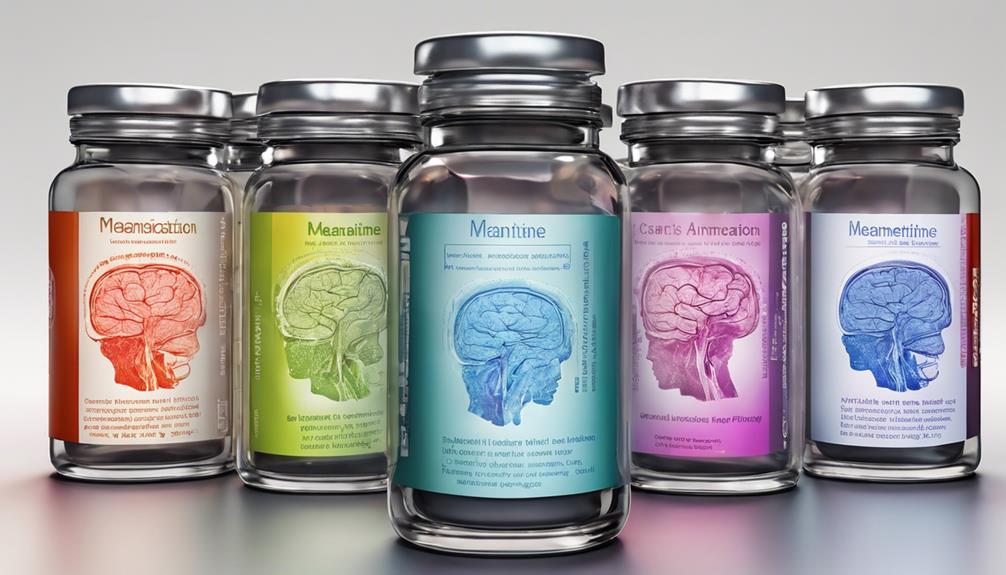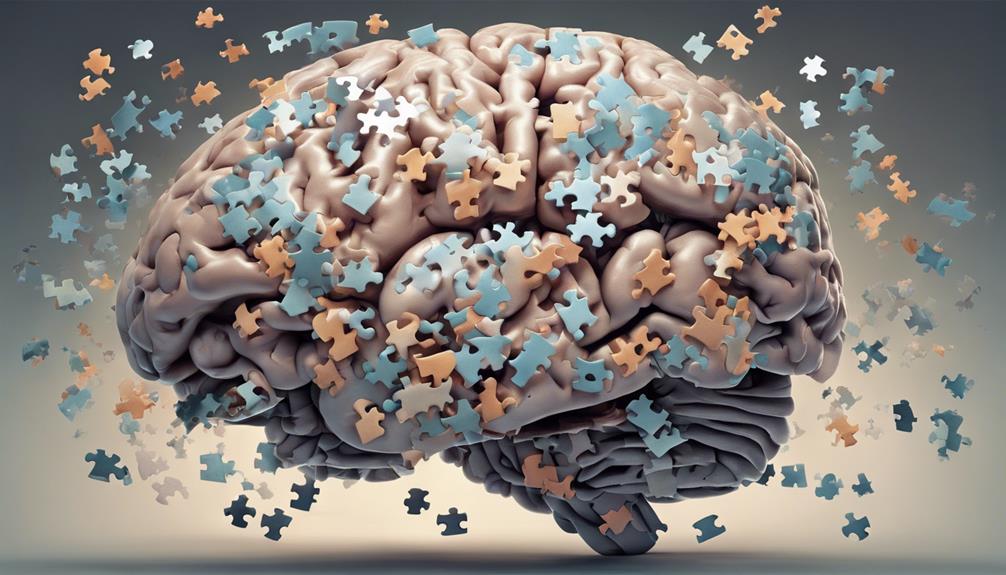When treating Alzheimer’s disease, pharmaceutical interventions are frequently essential for managing the symptoms associated with the condition.
However, the efficacy and impact of these medications are often subject to ongoing research and developments.
As we explore the nuances of available treatments and the potential for future advancements, one cannot help but contemplate the evolving landscape of Alzheimer’s medication and its implications for patients and caregivers alike.
Key Takeaways
- Cholinesterase inhibitors increase acetylcholine, improving nerve cell communication.
- Tailored dosages optimize benefits and reduce side effects.
- Early drug intervention may delay cognitive decline in Alzheimer’s patients.
- Alzheimer’s medications help manage symptoms, reduce caregiver burden, and improve patient well-being.
Understanding Alzheimer’s Medication

When exploring Alzheimer’s medication, it’s crucial to understand the mechanisms of action and potential side effects associated with these pharmaceutical interventions. Alzheimer’s disease is a complex condition that primarily affects memory and cognitive function. Medications for Alzheimer’s aim to manage symptoms, slow down the progression of the disease, and improve the quality of life for patients and their caregivers. It’s essential to consult healthcare professionals before starting any medication regimen, as they can provide valuable insights tailored to individual needs.
Understanding the mechanisms of action of Alzheimer’s medications involves grasping how these drugs interact with the brain to alleviate symptoms. Different classes of medications target various aspects of the disease, such as regulating neurotransmitters or reducing inflammation in the brain. However, it’s important to note that these medications may not work the same for everyone and can have varying degrees of effectiveness.
In addition to understanding how Alzheimer’s medications work, it’s crucial to be aware of potential side effects. Common side effects include gastrointestinal issues, dizziness, and fatigue. Monitoring for these side effects and promptly reporting them to healthcare providers is crucial for managing medication effectively. By staying informed about the mechanisms of action and potential side effects of Alzheimer’s medications, caregivers and patients can make well-informed decisions regarding treatment options.
Cholinesterase Inhibitors

Cholinesterase inhibitors are a class of medications used to treat Alzheimer’s disease. They work by increasing levels of acetylcholine, a neurotransmitter involved in memory and learning.
Common side effects include nausea, vomiting, and diarrhea.
Mechanism of Action
Exploring the role of cholinesterase inhibitors in Alzheimer’s treatment reveals their mechanism of action on neurotransmitter levels in the brain. These inhibitors work by blocking the enzyme cholinesterase, which usually breaks down acetylcholine, a key neurotransmitter involved in memory and learning.
By inhibiting cholinesterase, these medications increase the levels of acetylcholine in the brain, helping to improve communication between nerve cells and potentially slowing down cognitive decline in individuals with Alzheimer’s disease. This mechanism of action is crucial in managing the symptoms of Alzheimer’s and enhancing quality of life for patients.
Understanding how cholinesterase inhibitors function can aid healthcare providers in making informed decisions about treatment plans for those affected by this challenging condition.
Common Side Effects
In clinical trials and studies, researchers have identified several common side effects associated with the use of cholinesterase inhibitors in Alzheimer’s treatment. These side effects are important to consider when prescribing medication to patients.
Here are some of the common side effects:
- Gastrointestinal Disturbances: Patients may experience nausea, vomiting, diarrhea, or loss of appetite.
- Dizziness: Some individuals may feel lightheaded or dizzy, especially when changing positions.
- Muscle Cramps: There have been reports of muscle cramps or muscle weakness in some patients.
It is crucial for healthcare providers to monitor patients closely for these side effects and adjust treatment plans accordingly to ensure the best possible outcomes in Alzheimer’s management.
Dosage and Administration
When considering the dosage and administration of cholinesterase inhibitors for Alzheimer’s treatment, healthcare providers must carefully assess individual patient factors to determine the most appropriate course of action. It is crucial to tailor the dosage to the specific needs and tolerances of each patient to optimize therapeutic benefits while minimizing potential side effects. Below is a table outlining the typical dosages and administration guidelines for commonly prescribed cholinesterase inhibitors:
| Cholinesterase Inhibitor | Starting Dosage | Administration |
|---|---|---|
| Donepezil | 5 mg once daily | With or without food |
| Rivastigmine | 1.5 mg twice daily | With food |
| Galantamine | 4 mg twice daily | With morning and evening meals |
Memantine

We’ll now examine Memantine, a medication used in the treatment of Alzheimer’s disease.
This drug offers several benefits for individuals suffering from cognitive decline.
Understanding the proper dosage and administration of Memantine is crucial for its optimal therapeutic effects.
Benefits of Memantine
Undoubtedly, the efficacy of Memantine in managing symptoms of Alzheimer’s has been extensively studied and validated through clinical trials. The benefits of Memantine include:
- Slowing the progression of cognitive decline by regulating glutamate levels in the brain.
- Improving overall cognitive function and ability to perform daily tasks.
- Enhancing quality of life for both patients and caregivers by reducing behavioral symptoms such as agitation and aggression.
These benefits highlight the importance of Memantine in the treatment of Alzheimer’s disease, offering hope and improved outcomes for individuals affected by this condition. It’s crucial to consider these advantages when exploring treatment options for Alzheimer’s patients.
Dosage and Administration
In the management of Alzheimer’s disease, the appropriate dosage and administration of Memantine play a crucial role in optimizing treatment outcomes. Memantine is typically initiated at a low dose and gradually increased to reduce the risk of side effects. Below is a table outlining the standard dosing regimen for Memantine:
| Week | Dosage |
|---|---|
| 1 | 5 mg once daily |
| 2 | 5 mg twice daily |
| 3 | 10 mg in the morning and 5 mg in the evening |
| 4 | 10 mg twice daily |
It is important to follow the prescribed dosing schedule and consult healthcare professionals for any adjustments based on individual needs. Adhering to the recommended dosage and administration guidelines can help maximize the benefits of Memantine in Alzheimer’s treatment.
Combination Therapy

When considering Alzheimer’s treatment, healthcare professionals often explore the potential benefits of combination therapy involving multiple medications. This approach aims to target different aspects of the disease simultaneously, potentially leading to better outcomes for patients.
Here are some key points to consider regarding combination therapy:
- Synergistic Effects: Combining medications with different mechanisms of action may produce synergistic effects, enhancing the overall therapeutic benefit. For example, a combination of a cholinesterase inhibitor and a glutamate regulator could target both cholinergic and glutamatergic pathways implicated in Alzheimer’s disease.
- Reduced Risk of Drug Resistance: Using a combination of medications can help reduce the risk of developing drug resistance, a common issue with long-term monotherapy. By targeting multiple pathways, the likelihood of the disease adapting and becoming resistant to treatment may be decreased.
- Improved Symptom Management: Combination therapy may lead to more comprehensive symptom management by addressing a wider range of cognitive and behavioral symptoms associated with Alzheimer’s disease. This holistic approach could potentially improve the quality of life for individuals living with the condition.
Benefits of Medication

Exploring the benefits of medication in Alzheimer’s treatment reveals the potential for enhancing patient outcomes through targeted therapeutic approaches. Research indicates that medications such as cholinesterase inhibitors and memantine can help manage symptoms and improve cognitive function in individuals with Alzheimer’s disease. These medications work by regulating neurotransmitters in the brain, which can lead to enhanced memory, thinking, and overall quality of life for patients.
Furthermore, medication plays a crucial role in slowing down the progression of Alzheimer’s. Studies have shown that early intervention with certain drugs can delay cognitive decline and help individuals maintain their independence for a longer period. This highlights the importance of timely diagnosis and treatment initiation in Alzheimer’s care.
Additionally, medications can help alleviate behavioral and psychological symptoms associated with Alzheimer’s, such as agitation, aggression, and depression. By addressing these symptoms, medication not only improves the well-being of patients but also reduces caregiver burden, fostering a more supportive and stable environment for both patients and their families.
Managing Symptoms Effectively

To effectively manage symptoms in Alzheimer’s patients, a comprehensive approach that integrates medication with other therapeutic interventions is crucial for optimizing treatment outcomes. Our goal is to provide the best care possible for individuals living with Alzheimer’s disease. Here are three key strategies for managing symptoms effectively:
- Medication Management: Utilizing approved medications such as cholinesterase inhibitors or memantine can help improve cognitive function and manage behavioral symptoms. It’s essential to follow dosage instructions carefully and monitor for any side effects.
- Non-Pharmacological Interventions: Incorporating non-drug therapies like cognitive stimulation, physical exercise, and music therapy can enhance overall well-being and quality of life for Alzheimer’s patients. These interventions can help manage symptoms such as agitation, anxiety, and depression.
- Supportive Care and Education: Providing support for caregivers, offering educational resources, and creating a safe and stimulating environment are vital components of symptom management. Educating caregivers on effective communication techniques and stress management can significantly impact the quality of care provided to individuals with Alzheimer’s.
Potential Side Effects

Considering the potential side effects of Alzheimer’s medications is crucial for understanding the full spectrum of effects that may impact patients’ well-being. While these medications aim to improve cognitive function and quality of life, they can also present unwanted reactions. Common side effects include gastrointestinal issues like nausea, vomiting, and diarrhea, as well as dizziness, headaches, and fatigue. Some patients may experience changes in appetite, weight fluctuations, or sleep disturbances. It’s essential for caregivers and healthcare providers to monitor individuals closely for these potential side effects to ensure early intervention and management.
In rare cases, more severe side effects such as liver problems, allergic reactions, or behavioral changes like aggression or hallucinations can occur. Understanding these possibilities allows for informed decision-making when choosing the most suitable medication for each patient. Additionally, recognizing and addressing side effects promptly can help optimize treatment outcomes and enhance the overall well-being of individuals living with Alzheimer’s disease.
Dosage and Administration

When considering Alzheimer’s medication, it’s crucial to follow proper dosage guidance to ensure optimal treatment outcomes.
Timing of medication intake plays a significant role in its effectiveness, and adherence to prescribed schedules is essential.
Additionally, learning and implementing proper administration techniques can enhance the medication’s absorption and efficacy.
Proper Dosage Guidance
Understanding the recommended dosage and proper administration of Alzheimer’s medication is crucial for effective treatment. When it comes to dosing guidance, consider the following:
- Start Low: Begin with the lowest effective dose to minimize potential side effects.
- Gradual Increase: If necessary, slowly increase the dosage under medical supervision to achieve optimal results.
- Consistent Schedule: Take the medication at the same time each day to maintain a steady level in the bloodstream.
Timing of Medication
Optimal effectiveness of Alzheimer’s medication hinges on the precise timing of dosage administration, ensuring consistent therapeutic levels in the bloodstream. Timing plays a crucial role in maintaining the drug concentration needed for symptom management. Below is a table outlining the recommended timing for Alzheimer’s medication:
| Medication Type | Best Time to Take |
|---|---|
| Cholinesterase Inhibitors | Morning and Evening |
| Memantine | Once Daily, Same Time |
| Combination Therapy | Follow Individual Medication Schedule |
Adhering to the prescribed schedule is vital for the medication to work optimally. Consulting healthcare providers for personalized timing guidance can enhance treatment outcomes. Remember, consistency in timing can make a significant difference in managing Alzheimer’s symptoms effectively.
Administration Techniques
To ensure the effective administration of Alzheimer’s medication, it’s crucial to understand the proper dosage and administration techniques for each type of medication prescribed.
When assisting individuals with Alzheimer’s, caregivers must follow these key steps:
- Dosage Consistency: Maintain a consistent schedule for administering medication to ensure optimal effectiveness.
- Proper Administration: Follow the specific instructions provided by healthcare professionals to administer the medication correctly.
- Monitoring and Documentation: Keep track of the individual’s response to the medication, any side effects experienced, and share this information with healthcare providers.
Monitoring Progression

Monitoring the progression of Alzheimer’s disease involves regular cognitive assessments and medical evaluations to track changes in cognitive function and overall health. These assessments are crucial in understanding the evolution of the disease and adjusting treatment plans accordingly. Here is a table highlighting some key aspects of monitoring Alzheimer’s progression:
| Assessment Type | Frequency | Purpose |
|---|---|---|
| Cognitive Testing | Every 6-12 months | Evaluates memory, language, and problem-solving abilities. |
| Brain Imaging | As needed | Detects changes in brain structure and function. |
| Blood Tests | Annually | Screens for underlying conditions and evaluates medication effectiveness. |
| Physical Examination | Every 6 months | Assesses overall health and neurological status. |
Lifestyle Modifications

Implementing lifestyle modifications can play a significant role in managing Alzheimer’s disease progression. Research suggests that certain lifestyle changes can help improve cognitive function and quality of life for individuals with Alzheimer’s. Here are three key modifications that can be beneficial:
- Regular Physical Exercise: Engaging in activities like walking, swimming, or yoga can have positive effects on cognitive abilities and overall health. Physical exercise promotes blood flow to the brain, reduces inflammation, and may help in preserving memory functions.
- Healthy Diet: Consuming a balanced diet rich in fruits, vegetables, whole grains, and lean proteins can provide essential nutrients for brain health. Foods high in antioxidants, omega-3 fatty acids, and vitamins E and C are particularly beneficial for cognitive function.
- Social Engagement: Maintaining social connections and participating in social activities can help stimulate the brain and prevent feelings of isolation. Interacting with others, joining support groups, or volunteering can contribute to cognitive reserve and emotional well-being in individuals with Alzheimer’s.
Support for Caregivers

As caregivers, we must consider respite care options to ensure we have the support needed to maintain our well-being while caring for individuals with Alzheimer’s.
Emotional support resources play a crucial role in helping us navigate the challenges and emotions that come with caregiving.
Educational workshops provide valuable knowledge and skills that empower us to better understand and care for our loved ones with Alzheimer’s.
Respite Care Options
Exploring respite care options for caregivers of individuals with Alzheimer’s is crucial in providing much-needed support and relief. When considering respite care, caregivers should prioritize services that cater to the specific needs of their loved ones while also considering their own well-being.
Here are three key respite care options to consider:
- In-home respite care: Professional caregivers come to the individual’s home to provide care, allowing the primary caregiver some time off.
- Adult day programs: These programs offer supervised care during the day, providing social engagement and activities for individuals with Alzheimer’s.
- Residential respite care: Temporary stays in assisted living facilities or nursing homes can give caregivers a longer break while ensuring their loved ones receive proper care.
Emotional Support Resources
Effective caregiving for individuals with Alzheimer’s necessitates access to robust emotional support resources tailored to the needs of caregivers. Providing care for a loved one with Alzheimer’s can be emotionally challenging, and caregivers often require assistance and guidance to navigate this journey successfully. Here is a table outlining various emotional support resources available for caregivers:
| Emotional Support Resources | Description |
|---|---|
| Support Groups | Peer-led groups offering emotional support, information, and coping strategies. |
| Counseling Services | Professional counseling to address caregiver stress, grief, and emotional well-being. |
| Helplines | 24/7 hotlines providing immediate emotional support and guidance. |
| Online Forums | Virtual platforms for sharing experiences, seeking advice, and connecting with others. |
| Respite Care Services | Temporary care to give caregivers a break and time for self-care. |
Educational Workshops Available
Navigating the realm of available educational workshops is crucial for caregivers seeking additional support in managing the complexities of caring for individuals with Alzheimer’s. These workshops offer valuable insights, practical strategies, and emotional support to enhance caregiving skills and overall well-being.
Here are three key benefits of educational workshops for caregivers:
- Expert Guidance: Workshops are often led by specialists in Alzheimer’s care, providing evidence-based information and personalized advice.
- Peer Support: Caregivers can connect with others facing similar challenges, fostering a sense of community and understanding.
- Skill Development: Practical training sessions equip caregivers with tools to enhance communication, manage behaviors, and improve quality of life for both the individual with Alzheimer’s and themselves.
Research and Development

Through meticulous research and rigorous development processes, scientists are continuously striving to enhance our understanding of Alzheimer’s disease and improve treatment options. Research efforts focus on unraveling the complex mechanisms underlying the disease, exploring new therapeutic targets, and developing innovative medications.
| Research Area | Key Focus |
|---|---|
| Biomarkers | Identifying reliable biomarkers for early disease detection |
| Genetics | Investigating genetic factors contributing to Alzheimer’s |
| Drug Development | Formulating novel drugs to target disease pathology |
In the realm of Alzheimer’s research, biomarkers play a crucial role in aiding early diagnosis and tracking disease progression. Genetic studies help uncover the hereditary aspects of the illness, offering insights into potential risk factors. Concurrently, the development of new drugs aims to combat the underlying causes of Alzheimer’s, striving to provide more effective treatment options for those affected by the disease. This ongoing research and development endeavor represents a vital step towards advancing Alzheimer’s care and management.
Clinical Trials

In the realm of Alzheimer’s research, our focus shifts towards the critical domain of Clinical Trials, where the efficacy and safety of potential treatments are rigorously evaluated through structured investigations. Clinical Trials play a vital role in advancing Alzheimer’s treatment options by providing valuable insights into the effectiveness of new medications and interventions.
Here are three key aspects to consider:
- Participant Recruitment: Engaging individuals with Alzheimer’s disease and their caregivers is crucial for the success of clinical trials. Recruiting diverse participants ensures that the results are applicable to a broader population, enhancing the generalizability of the findings.
- Trial Design: The design of a clinical trial is meticulously planned to meet specific objectives while maintaining ethical standards. Randomization, blinding, and control groups are common features that help researchers draw reliable conclusions about the treatment’s efficacy.
- Data Analysis: Rigorous data analysis is essential to interpret the results accurately. Statistical methods are employed to assess the outcomes and determine whether the treatment under investigation shows significant benefits compared to a placebo or standard care.
Early Diagnosis Importance

Understanding the significance of early diagnosis in Alzheimer’s disease presents a pivotal opportunity to enhance treatment outcomes and quality of life for individuals affected by this condition. Early detection allows for timely intervention, access to support services, and the opportunity to participate in clinical trials that may slow disease progression. The table below outlines the key reasons why early diagnosis is crucial in Alzheimer’s disease:
| Benefits of Early Diagnosis | Explanation |
|---|---|
| Early Intervention | Enables prompt initiation of treatment and support services. |
| Care Planning | Facilitates the development of personalized care plans. |
| Participation in Clinical Trials | Allows individuals to access experimental therapies. |
| Improved Quality of Life | Helps maintain cognitive function and independence longer. |
Treatment Outlook

Exploring the latest advancements in Alzheimer’s medication provides valuable insights into the evolving landscape of treatment options for individuals affected by this condition. As researchers continue to delve into finding effective treatments for Alzheimer’s, here are key points to consider:
- Precision Medicine: Tailoring treatment plans based on an individual’s genetic makeup and specific subtype of Alzheimer’s disease shows promise in enhancing therapeutic outcomes and minimizing potential side effects.
- Immunotherapy Approaches: Investigational drugs targeting abnormal protein accumulation in the brain, such as beta-amyloid and tau, are being studied for their potential to slow down disease progression and preserve cognitive function.
- Multimodal Interventions: Combining pharmacological treatments with lifestyle modifications, cognitive training, and social engagement is gaining traction as a comprehensive approach to managing Alzheimer’s symptoms and improving overall quality of life. This holistic strategy aims to address the multifaceted nature of the disease and promote well-being in affected individuals.
Frequently Asked Questions
Can Alzheimer’s Medication Cure the Disease or Only Manage Symptoms?
Alzheimer’s medication aims to manage symptoms rather than cure the disease. While these drugs can help slow down the progression of cognitive decline and improve quality of life for some individuals, they don’t offer a cure.
Research continues to explore new treatments that may one day address the underlying causes of Alzheimer’s disease. For now, medications serve as a valuable tool in managing symptoms and enhancing patient well-being.
Are There Any Alternative Treatments or Complementary Therapies That Can Be Used Alongside Medication?
When exploring alternative treatments for Alzheimer’s, it’s essential to consider options that can complement traditional medications. Lifestyle changes, such as a healthy diet and regular exercise, have shown promise in supporting cognitive function.
Additionally, activities like cognitive therapy, music therapy, and art therapy can provide emotional and mental stimulation. These complementary approaches, when used alongside medication, may enhance overall well-being and quality of life for individuals living with Alzheimer’s.
How Long Does It Typically Take to See Improvement in Symptoms After Starting Alzheimer’s Medication?
Typically, improvement in Alzheimer’s symptoms can vary depending on the individual and the specific medication prescribed. While some may experience positive changes within a few weeks of starting medication, others may require several months to notice significant improvements.
It’s essential to closely monitor any changes in symptoms and consult healthcare providers regularly for adjustments in treatment plans if needed. Early intervention and consistent medication adherence can play a crucial role in managing Alzheimer’s symptoms effectively.
Are There Any Specific Dietary Restrictions or Guidelines to Follow While Taking Alzheimer’s Medication?
While taking Alzheimer’s medication, it’s essential to maintain a balanced diet rich in fruits, vegetables, whole grains, and lean proteins. Limiting saturated fats, sugars, and processed foods can support overall brain health. Additionally, staying hydrated and monitoring caffeine intake can be beneficial.
Following dietary guidelines can complement the effects of the medication and promote overall well-being. Remember, a healthy diet is a key component of managing Alzheimer’s and supporting cognitive function.
Is There a Specific Age or Stage of Alzheimer’s at Which Medication Is No Longer Effective?
At a certain stage of Alzheimer’s, medication may become less effective in managing symptoms and progression. Factors like disease severity, individual response to treatment, and overall health can influence the medication’s efficacy.
It’s crucial to work closely with healthcare providers to assess the ongoing benefits of medication and explore other forms of support and care as needed. Regular monitoring and adjustments to treatment plans are essential for optimizing quality of life.
Conclusion
In conclusion, when it comes to medication for Alzheimer’s, it’s crucial to explore all available options. Cholinesterase inhibitors and memantine are commonly prescribed, with combination therapy showing promise in improving symptoms. Research and development in this field continue to advance, with clinical trials providing valuable insights.
Early diagnosis is key to effective treatment, highlighting the importance of proactive healthcare. As they say, ‘the early bird catches the worm,’ emphasizing the significance of early intervention in managing Alzheimer’s disease.










